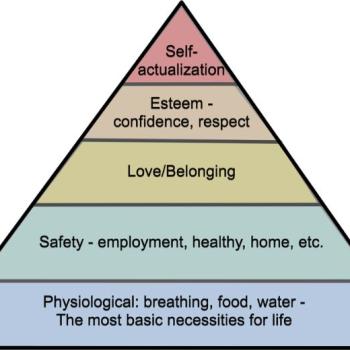
The Offending Statement
The phrase that I wanted to hold onto for so long and believe in was this:You are not your thoughts. You are observing your thoughts.
The Disturbing Thought
One day, I saw a girl walking through the church parking lot as I was looking for a space. This particular girl was continuously mean to my daughter both at church and school. In that moment, a thought flickered through my mind about how easy it would be to just accelerate right over her face. No. I didn’t step on the gas. The girl is fine, and she’s still being mean to my daughter. We’re finding other, less violent, ways to deal with it. Within seconds, I confessed that thought and made things right with God. I didn’t apologize to the girl, because I figured if I said anything directly to her it would weird her out. Who knows? She might tell her parents, and they might try to have me arrested. As terrifying as that random thought was, I was surprised to discover that homicidal ideation is not that uncommon. About one out of every two women and three out of four men (roughly two out of three people you come in contact with on any given day) have had at least one vivid homicidal thought. However, I was relieved to read that people only act out homicidal ideation in certain conditions, and definitely not if the ideation horrifies them as much as that one thought disturbed me. Also, you can’t be arrested for homicidal ideation, especially if it is fleeting, which is a great relief. So, under the human law, I’m not a murderer, but what about God’s law?Your Thoughts Matter
Jesus was forever trying to explain the Law to the Pharisees who pretended to love it so much. Most of them never got it. When it comes to what God wants for us and how He wants us to live, it’s all about the heart. Consider what Jesus said in His Sermon on the Mount:“You have heard that it was said to the people long ago, ‘You shall not murder, and anyone who murders will be subject to judgment.’ But I tell you that anyone who is angry with a brother or sister will be subject to judgment. Again, anyone who says to a brother or sister, ‘Raca,’ is answerable to the court. And anyone who says, ‘You fool!’ will be in danger of the fire of hell.” Matthew 5:21-22 (NIV)Then, later in that same sermon, He addressed adultery:
“You have heard that it was said, ‘You shall not commit adultery.’ But I tell you that anyone who looks at a woman lustfully has already committed adultery with her in his heart.” Matthew 5:27-28 (NIV)In Jesus’ mind (and, by extension, God’s mind), lustful thoughts equal adultery. And, going back to the previous discussion of anger and murder, we see that angry thoughts and words equal murder. I’d already done the equivalent of murdering that girl, in God’s eyes, when I became so angry with her for hurting my daughter. That’s why I immediately apologized to God for having that thought and turned away from it. In that moment, I wasn’t just observing my thought. I was actively doing what I could to make things right with the God of love, the God who wants me to love others as He loves me – and them. I was taking that thought captive (see 2 Corinthians 10:5), so that it didn’t turn into something else. If we’re not careful, our thoughts can become reality. They can define us. And that’s why Jesus, in His Sermon on the Mount, made such a big deal about thoughts. Our thoughts matter more than we want to admit sometimes.
The Pathway of Thoughts
Our thoughts don’t exist in a vacuum, no matter what my former favorite mantra tried to tell me. Our thoughts spring from somewhere – our beliefs, our emotions, our environment, our sensations, or perceptions. All thoughts have a starting point that can (and really should) be traced. And all thoughts lead to something we do. Some decision we make, whether it is to accept or reject the content of the thought. In 1885, Episcopal Bishop John Beckwith wrote:Plant a thought, and reap a word; plant a word, and reap an action; plant an action, and reap a habit; plant a habit, and reap a character; plant a character, and reap a destiny.

Transforming My Favorite Mantra
I don’t know why God let me go on believing and joyfully practicing this lie of a mantra for so long. Maybe He knew I wasn’t open to hearing the full truth yet. But I’m glad He finally did show me the truth, and it hit me like a ton of bricks the moment He revealed it. The pastor was asking how many verses about the heart we remembered. I immediately thought of this one:“For as he thinks in his heart, so is he.” Proverbs 23:7 (NKJV)And when I did, I remembered that lie I’d been telling myself repeatedly for over a year:
“You are not your thoughts.”Those two statements couldn’t be more at odds with each other. And if something isn’t in agreement with the Bible, it’s not the Bible that got it wrong. Seconds after that verse came into my mind, I repented of ever believing and saying anything else. I even took my favorite mantra and used it as a guide to create a new one. One that is much better aligned with the heart of God.
I am my thoughts. But if they do not honor God, I can take them captive and shine the light of His truth on them. Then, I can turn them over to Him and ask Him to replace them with thoughts that please Him.
You Can Change Your Mind
Our thoughts do, after all, define us. But the good news is we have the power to change them, especially if we have the Holy Spirit living inside us. The Apostle Paul encouraged the Roman believers to:“… be transformed by the renewing of your mind. Then you will be able to test and approve what God’s will is—His good, pleasing and perfect will.” Romans 12:2 (NIV)God’s will is for our minds to be transformed into the mind of Christ.* If we lean on Him and ask Him to help us, He will make sure that happens in our hearts, minds, and lives. No matter how many wrong steps we take, or how many bad thoughts we think, we can turn back to Him, and He will accept us with open arms. He is the Prodigal-Loving Father.
*This is an affiliate link. I may make a small commission, at no extra cost to you, if you purchase something from this link.

















